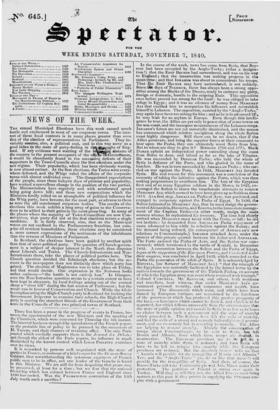In the course of the week, news has come from
Syria, that 'Bey- rout had been occupied by the Anglo-Turks; (what a designa- tion!) that the Emir BECHIR had surrendered, and was on his way tn.England ; that the insurrection was making progress in the mein -time ; and that IBRAHIM-PM about to concentrate his troops. That -4e Emir BECHIR may have surrendered, is not unlikely. Since U*- days of NIEHBUR, there has always been a strong oppo- sition among the Sheiks of the Druses, ready to embrace any party, foreign or domestic, hostile to the reigning Emir. This opposition once before proved too strong for the Emir : he was obliged to take refuge in Egypt ; and it was an advance of money from MEHEMET Aia that enabled him to reorganize his followers and reestablish himself in Lebanon. The opposition, assisted by the "Anglo-Turks," may again have been too strong for him ; and as he is in advanced he may 'Wish for an asylum in Europe. Even though this intelli- gence be true, the Allies are yet only in possession of some towns on the sea-coast, and the insurgent mountaineers of the Lebanon range, IBRAHIM'S forces are not yet materially diminished, and the season has commenced which renders navigation along the whole Syrian coast highly dangerous. Still there can be no doubt, that if -the Allies persevere, and bring the superior forces at their command to bear upon the Pasha, they can ultimately wrest Syria from him. But to whom are they to give it ? Between 170 and 1775, Sheik DARER upheld an independent power extending along the coast from Sidon to Acre, and inland as far as the lake of Tiberias. He was succeeded by DJEZZAR Pasha; who held the whole of Syria in defiance of the Porte, and who gloried in the name of butcher. He was in turn succeeded by ABDALL-All Pasha ; who car- ried on war against the Porte. In 1832, MEHEMET ALL invaded. Syria, His real reason for this movement was a conviction of the necessity of taking the initiative against the Porte, which was then making preparations to overthrow him. The loss of the Egyptian fleet and of so many Egyptian soldiers in the Morea, in 1825, en- couraged the Sultan to renew the treacherons attempts to remove MEHEMET Aro, which seemed to have been given up as fruitless since 1813. As a first step, ABDALLAII, Pasha of Acre, was pardoned, and engaged to cooperate against the Pasha of Egypt. In 1830, the Sultan intimated to Manaairr AM, that he must resign the govern- ment ofAlexandria, Damietta, and Rosetta, to the itnmediate manage- ment of the Capitau Pasha—in other words, resign the main sources whence he replenished his treasury. The time had clearly arrived when MalinstEr must break with the Porte, or fall: he did not hesitate: be demanded from Annaar.au Pasha repayment of sums advanced to him while in rebellion against the Sultan ; and his demand being refesed, (in consequence of AlIDALLAII'S new relations to Constantinople,) IBRAHIM attacked Acre, under the pretext of this private quarrel between his father and A RDALLAH. The Porte assisted the Pasha of Acre, and the Syrian war com- menced; which terminated ia the battle of Koniah, in December 1832. A convention between the Sultan and the Pasha of Egypt, begun at the suggestion of the European Powers, and terminated under their auspices, was concluded in April 1833, which conceded to the Pasha the possession of the whole of Syria. It is acknowledged by IttiPPELL, (no flatterer of MEHEMET Art,) " that the triumph of the Egyptians was materially facilitated by the hatred borne by the
natives towards the government of the Turkish Pashas, on account
of which the Egyptian army was everywhere received with triumph." Colonel CAMPBELL, Mr. KINNEAR, and others, both residents and travellers, bear witness, that under MEHEMET 11.es go-
vernment personal security, and commerce and wealth, have increased. The discontents which exist, and which have been fanned by European intrigue, are occasioned by the harshness of the government which has produced this greater prosperity of the laiel,-11 harshness which cannot be denied, and which is to be regretted, but which follows necessarily from the circumstance that the state of public opinion and morals in Syria is so loa as to leave no choice between such a government and the state of anarchy
which preceded it. The SyriAnS 1111V0 11:It the evils of anarchy, and feel the evils of a strong and scarcely half-enlightened govern- ment, mid see no remedy but ill reverting to anarchy. The Allies
are helping to restore anirchy. Already the concentsation of
troops about Constantinople, to be scut to S■ rill. has left Bosnia and Albania, from which these troops are drafteal, iii
insurrection. The European provinces are to lk jet sin a state of anarchy while Syria is reduced ; and than S■ ria will have to be left to relapse into anarchy w bile the di aropean provinces are reduced. But the al/Las/nog (ias, ft tells us, that
Austria will provide for the trationinv of It )snia and Albania." Yes and the " Anglo-Turks" (we do so like that name !) will provide for the tranquillity of S% ria. And then, of course, the )Ausso-Turks will take Constantinople and Asia Minor under their protection. The partition of Poland is acting over again in Turkey. Will they or will they not, the Allied Powers must bring matters to this pass it' they persist in supplying the Ottoman em- pire with a government.


























